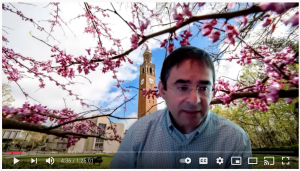
The MEITE program’s fourth Pitch Day took place on July 31, 2020, and it featured 10 students pitching their ventures. This event was held on online due to the COVID-19 pandemic. Please use the links to the left to view the event and access the presenters’ website and slide decks below.
Sarah Lasseter – STEM Video Cafe
 STEM Video Cafe is a searchable web platform for high-quality secondary STEM videos linked to national education standards. We connect teachers with the digital video tools they need to support student learning, saving them time, effort, and stress.
STEM Video Cafe is a searchable web platform for high-quality secondary STEM videos linked to national education standards. We connect teachers with the digital video tools they need to support student learning, saving them time, effort, and stress.
Today, many STEM teachers use videos to support their learning goals, but hundreds of thousands of hits appear when searching for videos on science instructional objectives online. Cellular respiration, a topic in most introductory Biology courses, yields 487,000 videos in a Google search. While some users gravitate toward favorite creators on YouTube, not all educational videos are designed with best practices for learning in mind. Many popular STEM video channels regularly use features that detract from learning. With the current demands on teachers to create effective digital learning environments, secondary STEM teachers have an immediate need to find high-quality video materials for instruction. In this stressful climate, many teachers are desperate for these materials.
STEM Video Cafe meets an immediate need for virtual content in today’s rapidly changing education landscape. We provide an easily searchable video platform linked to national standards, as well as digital tools to help teachers effectively integrate videos into their classrooms.
Are you ready to teach with digital videos without getting lost in the YouTube rabbit hole? STEM Video Cafe will help you find great STEM Videos, fast.
Naima Rashid – Teacher Lab
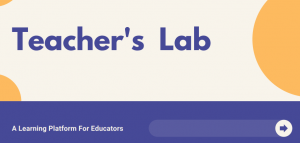 Teachers are the central players for bringing innovative practices in class that affects children’s learning outcome. Yet, in a developing country like Bangladesh, very little support is provided to train teachers in order to teach with digital tools effectively in the classroom. Teacher’s Lab is a company that specializes in providing professional development courses to Bangladeshi K-12 educators who wishes to integrate education technology in their classrooms.
Teachers are the central players for bringing innovative practices in class that affects children’s learning outcome. Yet, in a developing country like Bangladesh, very little support is provided to train teachers in order to teach with digital tools effectively in the classroom. Teacher’s Lab is a company that specializes in providing professional development courses to Bangladeshi K-12 educators who wishes to integrate education technology in their classrooms.
The first course “Tech Integration for Educators” consists of ten chapters where teachers will be acquainted with EdTech frameworks, emerging technologies and trends in education and learn about innovative practices in the classroom while using digital tools. By emphasizing on contextualized examples that ranges across all content areas and using open-resourced, web-based tools, this course ensures that our teachers have access to high quality resources and EdTech tools they require to begin teaching with technology. Access the course at: Tech Integration for Educators
Daisy Magnus-Aryitey – Ice House Pitch Deck
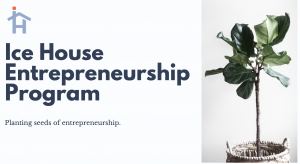 There are several organizations that offer educational programming designed to introduce children and adolescents to entrepreneurship. These educational opportunities are often project-based, experiential, and held outside of the traditional school environment. Content-wise, these programs often put an emphasis on the operational and financial aspects of running a business. The Entrepreneurial Learning Institute (ELI), however, differs from other educational programs in that its emphasis is developing the entrepreneurial mindset. ELI’s program was created around the Clifton Taulbert’s “Who Owns the Ice House?”. “Who Owns the Ice House” and its accompanying IHEP curriculum is an academic examination of how to develop the mindset and habits of an entrepreneur. The program posits that such a mindset is a valuable asset in any academic or professional career.
There are several organizations that offer educational programming designed to introduce children and adolescents to entrepreneurship. These educational opportunities are often project-based, experiential, and held outside of the traditional school environment. Content-wise, these programs often put an emphasis on the operational and financial aspects of running a business. The Entrepreneurial Learning Institute (ELI), however, differs from other educational programs in that its emphasis is developing the entrepreneurial mindset. ELI’s program was created around the Clifton Taulbert’s “Who Owns the Ice House?”. “Who Owns the Ice House” and its accompanying IHEP curriculum is an academic examination of how to develop the mindset and habits of an entrepreneur. The program posits that such a mindset is a valuable asset in any academic or professional career.
Steven Williamson – Designing Educational Experiences for Online Environments
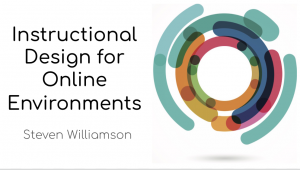 Designing Educational Experiences for Online Environments will be a 15-module online course that affords students the opportunity to learn more about instructional design. The course will explore current instructional design frameworks, methods, E-Learning authoring Tools, and give users the opportunity to build instructional artifacts that can be referenced in their personal portfolios. The course will specifically focus on designing educational experiences for asynchronous & synchronous online learning environments.
Designing Educational Experiences for Online Environments will be a 15-module online course that affords students the opportunity to learn more about instructional design. The course will explore current instructional design frameworks, methods, E-Learning authoring Tools, and give users the opportunity to build instructional artifacts that can be referenced in their personal portfolios. The course will specifically focus on designing educational experiences for asynchronous & synchronous online learning environments.
Wei Chen – You Deserve Help
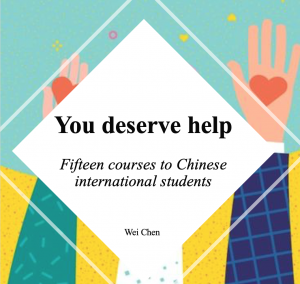 Chinese nationals make up the largest group of international students in the United States. They account for roughly 30% of all foreign students. There were about 340,000 of them (Youyouzhou,2018). They have a greater impact on the United State college and university education. However, due to difficulties with acculturation, Chinese international students often experience language barriers, social isolation, and culture shock. Those will lead them to suffer from mental illness. According to several studies, these students have high levels of depression and anxiety symptoms but disproportionately low utilization rates for professional counseling services (Cheung, 2011; Han et al., 2013; Wei et al., 2007). In order to help them learn depression and anxiety in a scientific and warm context and learn how to get rid of the stigma and embrace their vulnerability, I have created this series of courses named “You deserve help.” These 15 courses have mainly four components. One is the basic knowledge of depression, anxiety, and vulnerability. The second part is the strategies to cope with them and professional resources that Chinese international students can make use of. The third is an authentic and warm platform for my customers to share their personal experiences and stories, which are related to the three themes. The last component is a community for them to practice their vulnerability and experience the power of vulnerability, which is authenticity, courage, connection, and love.
Chinese nationals make up the largest group of international students in the United States. They account for roughly 30% of all foreign students. There were about 340,000 of them (Youyouzhou,2018). They have a greater impact on the United State college and university education. However, due to difficulties with acculturation, Chinese international students often experience language barriers, social isolation, and culture shock. Those will lead them to suffer from mental illness. According to several studies, these students have high levels of depression and anxiety symptoms but disproportionately low utilization rates for professional counseling services (Cheung, 2011; Han et al., 2013; Wei et al., 2007). In order to help them learn depression and anxiety in a scientific and warm context and learn how to get rid of the stigma and embrace their vulnerability, I have created this series of courses named “You deserve help.” These 15 courses have mainly four components. One is the basic knowledge of depression, anxiety, and vulnerability. The second part is the strategies to cope with them and professional resources that Chinese international students can make use of. The third is an authentic and warm platform for my customers to share their personal experiences and stories, which are related to the three themes. The last component is a community for them to practice their vulnerability and experience the power of vulnerability, which is authenticity, courage, connection, and love.
Jake Harrison – SongRight
 SongRight is a company dedicated to teaching K-12 students creative music skills by developing engaging online courses. The MVP, Songwriting Foundations, targets middle school-aged students that are beginning instrumentalists and songwriters. The course consists of 8 weekly online lessons intended to provide students with a balanced foundation of musicianship skills. Students will learn music theory, instrument technique, lyric writing, and musical creativity. Users are placed into small, collaborative, cohorts led by an experienced music teacher that guides the class asynchronously through the content. Costs are kept low to be accessible to as many students as possible, and all lectures are freely available online.
SongRight is a company dedicated to teaching K-12 students creative music skills by developing engaging online courses. The MVP, Songwriting Foundations, targets middle school-aged students that are beginning instrumentalists and songwriters. The course consists of 8 weekly online lessons intended to provide students with a balanced foundation of musicianship skills. Students will learn music theory, instrument technique, lyric writing, and musical creativity. Users are placed into small, collaborative, cohorts led by an experienced music teacher that guides the class asynchronously through the content. Costs are kept low to be accessible to as many students as possible, and all lectures are freely available online.
Jacob Stiglitz – Parade Thesis Deck
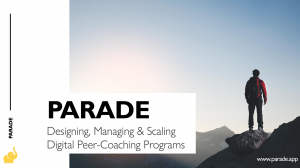 Research shows that people are 95% more likely to accomplish their personal development goals when they connect regularly with an accountability partner. Parade enables experts with established personal development programs to create virtual accountability partnerships within their member community. Through Parade, program participants are more likely to achieve their goals, and experts are able to better serve their customers.
Research shows that people are 95% more likely to accomplish their personal development goals when they connect regularly with an accountability partner. Parade enables experts with established personal development programs to create virtual accountability partnerships within their member community. Through Parade, program participants are more likely to achieve their goals, and experts are able to better serve their customers.
Parade matches participants together based on a variety of factors ensuring compatibility including desired goal, previous progress, personal values, and time-zones among others. Parade’s software solution delivers program content in a scaffolded manner based on demonstration of progress, and guided discussion and reflection questions prompt participants to engage in meaningful discussion around their goals. In addition to providing required daily updates, partners are encouraged to support one another through problem solving, support, motivation, and celebrating successes both along the way and upon completion.
Alex Hoppe – Immersive Media in Education
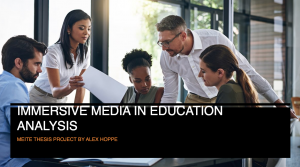 This report aims to assess the current state of immersive media and identify what exactly immersive media in education means and looks like. In the rapidly evolving field of immersive media we will explore the history, present and future of immersive media through interviews with experts in immersive education and a review of literature on implementation of immersive technology in education. This report also aims to provide a method of categorizing immersive experiences and a rubric for evaluating immersive educational experiences.
This report aims to assess the current state of immersive media and identify what exactly immersive media in education means and looks like. In the rapidly evolving field of immersive media we will explore the history, present and future of immersive media through interviews with experts in immersive education and a review of literature on implementation of immersive technology in education. This report also aims to provide a method of categorizing immersive experiences and a rubric for evaluating immersive educational experiences.
Paige Harriman – Climate Detectives Pitch Deck
 This venture is proposed as a series of games where players go through quests about climate change troubles that impact their area (or will impact their area.) For the summer edition of Climate Detectives, I plan to build a game for learners in rural communities in North Carolina and the greater Southeast Coast.
This venture is proposed as a series of games where players go through quests about climate change troubles that impact their area (or will impact their area.) For the summer edition of Climate Detectives, I plan to build a game for learners in rural communities in North Carolina and the greater Southeast Coast.
Joel Wright – SLOPE Framework Slides
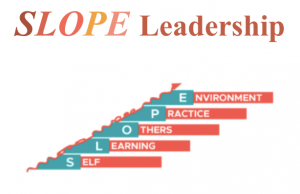 What would the world look like if all young people developed leadership skills? Historically, leadership development has been a privileged pedagogy limiting access to a select few. Since early evidence for youth leadership development in schools shows a positive correlation with belonging, engagement, and grades, how can leadership development help the current remote learning reality? SLOPE Leadership aims to be the “Khan Academy” of leadership development, providing a free resource hub for educators to access next-generation leadership development solutions. However, there are multiple challenges to integrating leadership development into schools. First, educators define leadership in many different ways which limit efforts to organize, integrate, and systemize the subject. Would any subject in school be taught with such lax rigor? Secondly, educators lack the time to search, customize, and integrate leadership into educational efforts. The SLOPE Leadership platform addresses these challenges. It is codified in a research-based leader development framework, has content that is sourced by educators for educators, offers customizable resources that enable educators to authentically bring it to life for their students, and provides professional support to integrate leadership development into pre-existing efforts. Providing all students access to leadership development has the potential to increase belonging, engagement, and build healthier learning communities while simultaneously developing boundary-spanning citizens, employees, and leaders capable of collaborating to source new solutions to society’s challenges.
What would the world look like if all young people developed leadership skills? Historically, leadership development has been a privileged pedagogy limiting access to a select few. Since early evidence for youth leadership development in schools shows a positive correlation with belonging, engagement, and grades, how can leadership development help the current remote learning reality? SLOPE Leadership aims to be the “Khan Academy” of leadership development, providing a free resource hub for educators to access next-generation leadership development solutions. However, there are multiple challenges to integrating leadership development into schools. First, educators define leadership in many different ways which limit efforts to organize, integrate, and systemize the subject. Would any subject in school be taught with such lax rigor? Secondly, educators lack the time to search, customize, and integrate leadership into educational efforts. The SLOPE Leadership platform addresses these challenges. It is codified in a research-based leader development framework, has content that is sourced by educators for educators, offers customizable resources that enable educators to authentically bring it to life for their students, and provides professional support to integrate leadership development into pre-existing efforts. Providing all students access to leadership development has the potential to increase belonging, engagement, and build healthier learning communities while simultaneously developing boundary-spanning citizens, employees, and leaders capable of collaborating to source new solutions to society’s challenges.